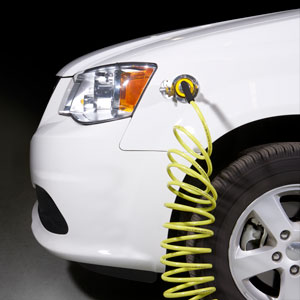
Anyone who has noticed increased gasoline prices may be wondering about alternative fuel sources for automobiles. But price is not the only thing fueling national interest in alternative automotive technology. Energy efficiency, resource availability, and environmental concerns all play parts in the ongoing search for other forms of reliable fuel. While many people have grown familiar with electric or hybrid cars, they may have less understanding of natural gas vehicles (NGVs) which are still relatively rare in the United States.
The Rise of Natural Gas
CNET On Cars – Car Tech 101: Inside natural-gas cars
Unlike electric cars, an NGV basically functions with the same propulsion based engine as cars that run on gasoline, it simply uses a different kind of fuel to do it. Although natural gas has been used for a long time by utility and chemical companies, it is only beginning to be fully embraced as transportation fuel. Natural gas is different from petroleum in that its natural form is gas rather than liquid. It’s derived from organic matter near oil deposits, extracted by drilling, and transported via pipelines. Like gasoline and diesel fuel, natural gas is combustible.
Given concerns over fracking, the hydraulic fracturing process used in drilling and extracting natural gas, there is debate over the environmental cost of making natural gas more plentifully available. If such concerns can be allayed, the possibility of transitioning more cars to natural gas fuels is attractive, in part because natural gas is a domestic resource and would help lessen the country’s heavy reliance on importing petroleum mainly for use in powering our vehicles.
Is It Practical?
Natural Gas Vehicles Video & CNG Car Conversion Overview w/ The CARLAB
A natural gas vehicle works much like a petroleum powered car with some modifications made in its fuel storage, chassis, and engine. While NGVs can be fueled relatively quickly at a pump like gasoline cars, they can also be fueled more slowly. Honda, one of the leaders in the industry, makes a pump that owners of the Civic NGV can use from home, tapping into their already existing gas line and fueling their car overnight. Since there are only about 1,300 natural gas fueling stations in the country, the home pump helps address limited availability.
The question of environmental costs and benefits is complicated. One of the advantages to NGVs is that they run more cleanly than gasoline powered cars, in part because natural gas has a higher component of hydrogen. That means an NGV has significantly lower emissions in every category: greenhouse gases, carbon monoxide, particulate matter, nitrogen oxide, and volatile organic compounds. It manages to run “greener” while providing a similar fuel economy. When you combine all that with the fact that it’s a cheaper and domestic fuel source, it’s easy to see why automotive companies like Honda, Chrysler, Ford and GM are bringing new NGVs onto the market.
Will It Catch On?

Should You Convert Your Car to Natural Gas?
An NGV functions well and safely, with only slight changes in how it drives, such as slower acceleration. The biggest drawback today is still the limited availability of the fuel and fueling stations. NGVs have a smaller fuel tank which means you need to fill up more often, currently a difficult prospect. The sticker price for an NGV is also still higher than a regular gasoline vehicle. If you add in installation of a home fuel pump (not yet possible everywhere) you’re looking at a significantly higher initial cost.
Although NGVs have not yet fully caught on among mainstream automobile drivers, the technology has made inroads into the trucking industry. If the infrastructure needed to support more NGVs can be put into place, and if environmental concerns about natural gas extraction can be addressed, there’s a good possibility that cars running on compressed natural gas could be an important alternative automotive choice in the future.




